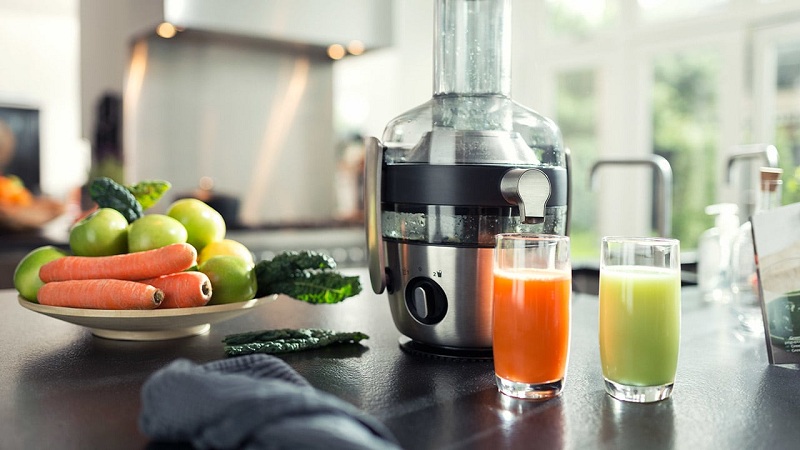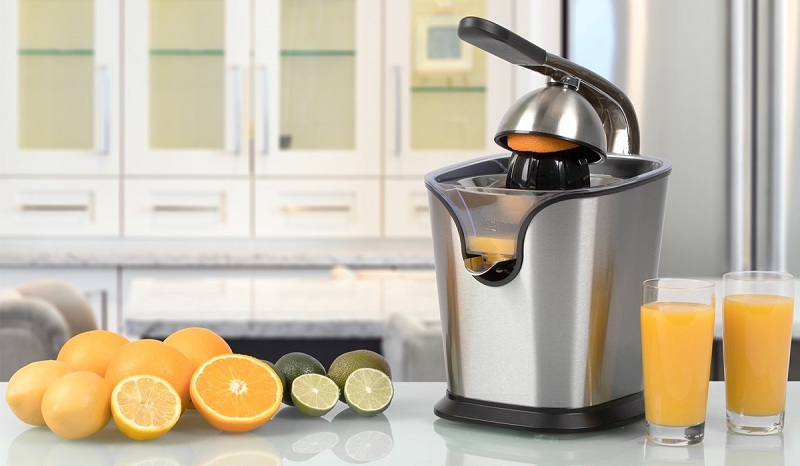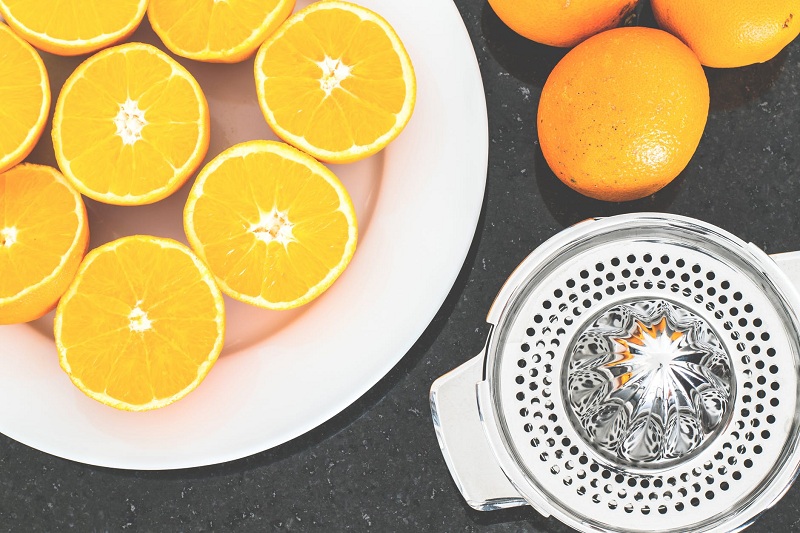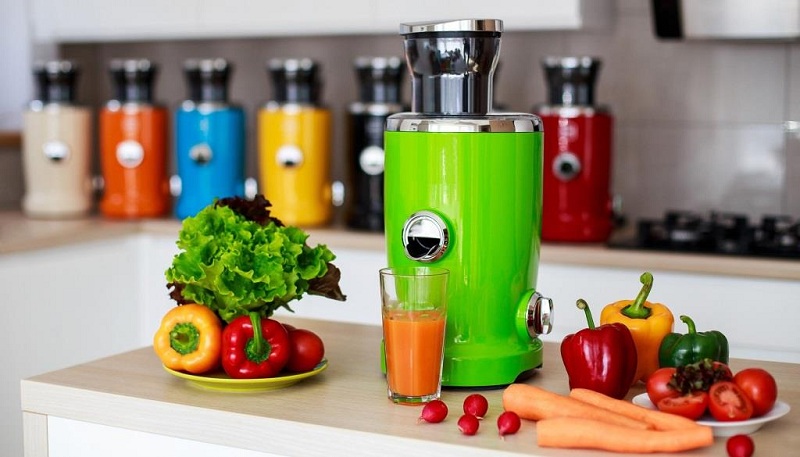Delicious natural juices love absolutely everything! For their preparation, mechanical or automatic type juicers are used, which make it possible to obtain juice from beets, carrots, plums, citrus fruits, other hard and soft vegetables, and fruits. Today we will talk about which is better to choose a juicer for domestic use.
Types and main characteristics of choose a juicer
All juicers can be divided into 4 groups, given their design features and principle of operation. Consider each view.
Citrus models
Such fruit appliances are electrical and mechanical. They are thin, used for grapefruits, tangerines, oranges, limes, lemons. Any system for processing citrus fruits is equipped with a cone-shaped ribbed element, to which half of the fruit is pressed. The rotation of the element entails squeezing the juice, these devices have several disadvantages:
- cooking takes a lot of time;
- Low extrusion quality.
Citrus juices are small in size, ideal for people who do not want to give up tasty drinks while working or traveling. Suitable for 1-2 people, if the family consists of 3 people or more, then the preparation of fresh juice for everyone will take the lion’s share of the time.
Manual Juicer for Vegetables
Speaking about which is better to choose a juicer, do not forget about the manual models. They are equipped with knives, a camera and a handle; they are used to process soft fruits: tomatoes, berries, and others. Cake can be scrolled several times, so you can make a large amount of natural drink.
Screw mechanisms
Products are horizontal and vertical. The first have a narrow inlet, the second – wide and are compact. Used primarily for the preparation of juice from herbs, seeds, long plants, such as celery. Their advantages include:
- the possibility of obtaining juice with pulp;
- organic fresh can be stored for 2 days;
- long continuous work (till 30 minutes);
- Minimum waste.
Experts identify the following disadvantages:
Vertical screw juicers are not suitable for tomatoes and vegetables with similar density;
- Almost all types of raw materials must be crushed before being put into the device.
- The screw shaft with which the device is equipped consists of several sections, effectively cutting, grinding, mixing and squeezing the liquid from the fruit to the last drop!
Centrifugal devices
The device processes the components of fruits and vegetables due to centrifugal force: the cake moves at a great speed in a closed chamber, because of which the pulp is pressed against the walls, releasing a lot of liquid. It has a number of advantages:
- universality;
- affordable price;
- High performance.
Of the minuses are the following:
- During spinning, the juice heats up, losing some of its beneficial properties. It can also oxidize, as evidenced by reviews of real forum users;
- The drink is not stored for a long time; you need to drink it within 30 minutes;
- Large amount of waste.
Suitable for solid vegetables, has good efficiency.
What else to look for when choosing?
Reflecting on how to choose a home juicer, pay attention to a number of characteristics:
- Case material
- Power,
- Tank volume for cake and liquid,
- Additional functions.
We will tell about these and other features now.
Body material
This characteristic does not affect the functionality, but the lifetime of the device depends on it. For the manufacture of housing manufacturers use steel or plastic. Products from plastic have the smaller weight and the price, the steel case more strong, expensive and heavy.
Speeds
The number of speeds is an important characteristic, because individual modes are necessary for grinding different fruits. Soft berries are wrung out at minimum speeds, carrots or beets – at maximum speeds. The number of speeds can be from 1 to 9, the more of them, the easier it is to prepare the juice from raw materials with different density.
Power
When deciding which juicer to choose, be sure to review the power data. Standard devices have a power of 200-1200 watts. The higher it is, the faster the freshness will be prepared. Also, the nominal power affects the type of raw material that you will process in the device (soft, hard). For a family of 3-4 people suitable juicer with a capacity in the range of 500-600 watts.
Capacity for juice and pulp
When choosing, remember that some models have a built-in capacity for collecting fresh, having a volume of about 200-1000 ml. Other juicers have a direct beverage supply, so you have to use your own dishes or the one that came with the device.
Pressed pulp is dumped into the pulp tank. Most often, the tanks are removable, their volume is 350-2500 g. The greater the volume, the less often you will have to remove and clean the tank during the preparation of fresh.
Additional functions
Also, the device can be supplemented with the following functions that will significantly simplify the process of operation:
- Pulsed mode, preventing overheating during the processing of solid fruits. The engine will function, making short pauses;
- “Drop-stop”, preventing the leakage of fluid on the working surface. In this case, the feed spout can be raised upwards;
- Automatic pulp ejection allowing removing cake from the centrifuge without interrupting operation. A special container is provided for this function;
- Neck width. If you need to prepare fresh apples, pears and other large fruits, you should choose models with a neck with a diameter of at least 65-70 mm.
In the ranking of the best manufacturers, brands Bosch, Braun, Moulinex, Panasonic and Philips are leading, whose products are famous for their high quality. In deciding which buy a juicer, try to give preference to household appliances proven companies. Even if the product fails, you will easily find the necessary components for repair.
Summing up
We talked about how to choose a juicer for making organic drinks. In conclusion, we will give several recommendations for care and maintenance:
- Clean the product after each use, otherwise it may mold, exude an unpleasant odor;
- After washing, dry all the elements of the product well;
- Do not put solid vegetables in low-power devices, because the equipment will simply burn.
When choosing a juicer, consider your taste preferences, the amount of juice you want to receive daily. For example, screw models are ideal for regular processing of berries, seeds, and greenery; centrifugal for apples and beets. If you eat fresh juice a few times a month, order electric or mechanical citrus juices. For the processing of tomatoes and berries that you can preserve, it is better to purchase a classic hand model!







